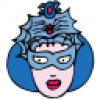A flicker of movement catches my eye at the base of a sun-bleached, fallen cedar tree.
As the hot Florida sun beats down on my back, I slip in closer and spot my quarry, hiding against the trunk. It relies on its excellent camouflage to hide, but I know right where it is. I carefully position myself, launch my attack, and successfully make the capture!
However, my hunting expedition isn’t a traditional one. My quarry is the brown anole lizard. My weapon is an old fishing pole converted into a noose that allows me to harmlessly capture the lizards. And my trophy? Data, and lots of it!
This scenario unfolds many times a day when I am on one of my field expeditions, a regular occurrence in my current job as a research biologist. It’s a job I love, but my path to becoming a biologist is not something I just fell into. It started early and took a lot of hard work.
Animals: My Childhood Passion
When I was a kid, I spent my free time exploring the natural areas near my home. Some of my earliest and best memories are from catching and observing animals in the waters and woods near our home. I also became a bookworm, reading mostly non-fiction books about the animals I loved. However, I never realized these passions could lead to a career as a biologist until much later.
When I was first exposed to science at school, I learned about facts and concepts that were already well known. As a student reading a textbook, it seemed that scientists already knew just about everything there was to know. Yet, when I got to college, I started to realize that this really wasn’t true.
I learned that scientists weren’t just people who knew a lot of facts about the world around us, but were skilled in something much more special. They were skilled in creating knowledge. Science is not just a bunch of facts, but rather a process where we can carefully learn new and true things about the world around us.
As scientists, we gather evidence to answer previously unanswered questions. I learned that though we already know a lot, we certainly don’t have it all figured out. There are endless problems and questions for scientists to work on. To me, science was very exciting and something I wanted to be a part of!
The Fascinating World Of Science
So, in 2008, I began a Ph.D. program in Ecology and Evolutionary Biology. It was over the following years that I really learned the ins and outs of being a scientist. This entailed lots of reading and critical evaluation of scientific papers, developing my own creative ideas that would advance our knowledge in biology, and then implementing those ideas as research projects.
My research centered on understanding how turtle mothers can have an important influence on their babies, despite abandoning them after laying the eggs. After lots of challenges and hard work, I defended my dissertation and earned my doctoral degree in 2013!
Today, I have a research position as a “postdoctoral” researcher which is similar to a residency for a medical doctor. And it’s for this new job that I find myself frequently on the hunt for lizards. But I’m not just aimlessly catching lizards. I’m now a bonafide scientist- on the quest for creating new knowledge!









